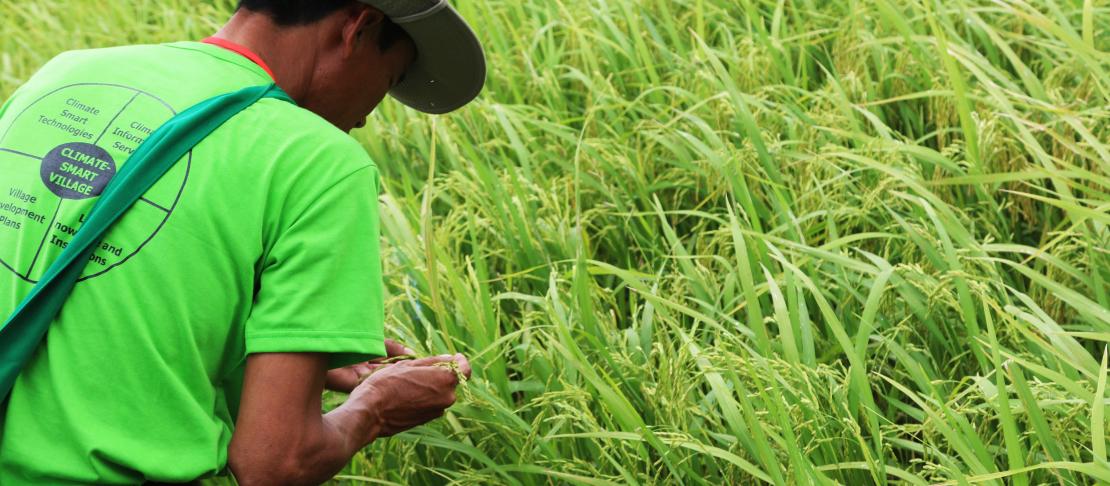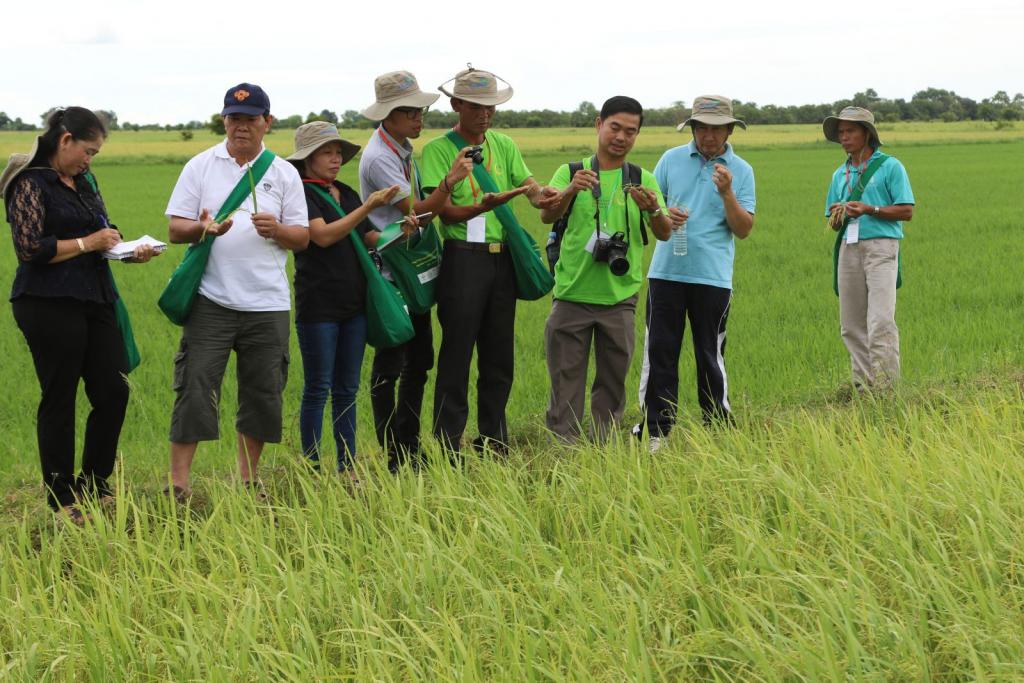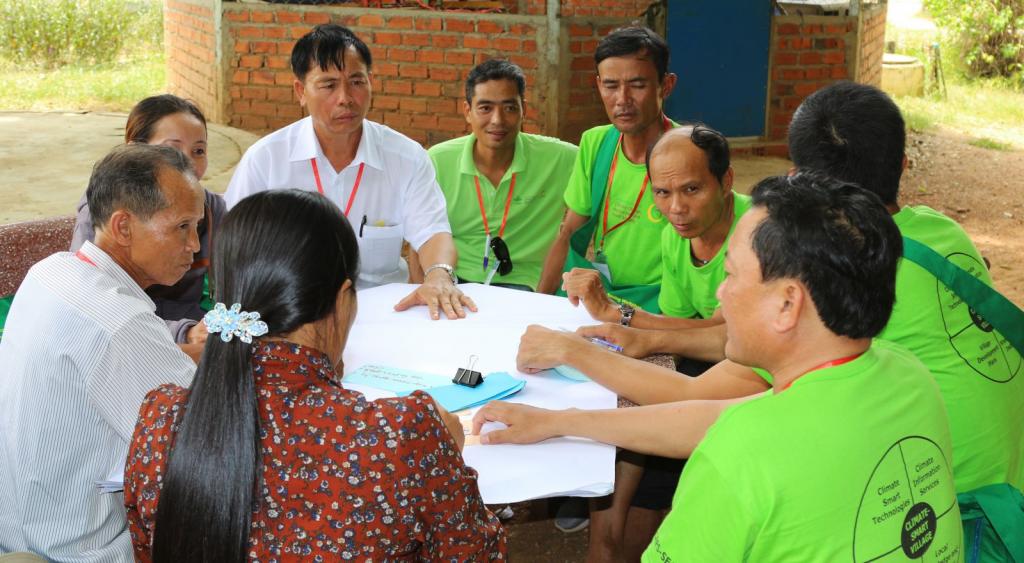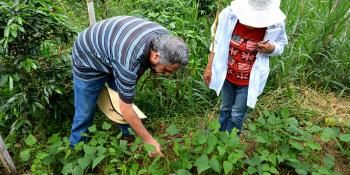Developing climate-smart farmers using knowledge-sharing and on-site learning approaches

Through cross-learning, community leaders from the various Climate-Smart Villages in Southeast Asia learned about the appropriate climate-smart agriculture technologies and practices to scale up.
In 2015, the Climate-Smart Village (CSV) concept was introduced in Southeast Asia. Through the CGIAR Research Program on Climate Change, Agriculture and Food Security (CCAFS), CSVs were established in the region to serve as models of climate-resilient communities and field laboratories of climate-smart technologies and practices. Currently, there are seven CSVs in the region, including: Ma, My Loi, and Tra Hat in Vietnam; Phailom and Ekxang in Laos; Rohal Suong in Cambodia; and Guinayangan in the Philippines.
To further enhance CSV implementation in Southeast Asia, a roving workshop was conducted in Siem Reap and Battambang, Cambodia, from 14 to 18 August 2017. The workshop specifically aimed to: enhance the participants’ knowledge of CSA technologies and practices via experiential/field learning; facilitate sharing of knowledge and experiences on CSA technologies and practices among farmers and CSV support teams; and demonstrate community-based CSA approaches that are successful in Cambodian context.
Twenty six farmers and local leaders, not only from the CSVs, but also from communes and districts where the CSVs are located, attended the workshop. According to Dr. Leocadio Sebastian, the regional program leader of CCAFS SEA,
in this roving workshop, we are engaging local leaders beyond the CSVs as possible advocates for upscaling. The workshop would expose them to different options for making their communities climate-smart.”
Also present in the workshop were the interpreters for the Vietnamese and Laos participants, and the researchers from CCAFS SEA and WorldFish, the lead center for the Cambodian CSV.
The participants visited the climate stress tolerance rice field model in Rohal Suong CSV. Photo: Leo Sebastian (CCAFS)
Knowledge exchange and on-site learning
The workshop harnessed knowledge-sharing and experiential learning methodologies. The participants from the seven CSVs presented the status and progress of their respective CSA initiatives. Some of the good CSA technologies and practices presented are the following: climatic stress tolerant rice varieties, water harvesting, ecological engineering, plant clinic, compost productions, and integrated crop management.
Field visits were organized for the participants to observe and reflect on CSA technologies and practices on the ground. The participants visited the Rohal Suong CSV and other project areas implementing CSA technologies and practices such as the poultry farm in Prey Leav village, Don Bosco vocational school, rice field fisheries project site in Trapieang Kuy village of Sonikum district, rice seed production of IRRI-USAID project sites, and safe vegetable garden of World Vegetable Center. For instance, in their visit to the vegetable and home gardening in Siem Reap, the participants were exposed to the applied farmer field school approach, community pond management, production and application of organic pesticide and fertilizer, and intercropping of annual and perennial vegetables.
Beyond the technologies, in their visit to the Community Fish Refuge Pond in Siem Reap - a rice field fisheries project, the participants also learned about the political and social dimensions of a CSA project such as the participatory planning approach, strong commitment from community leaders, internal regulations, and community fundraising activities.
Showcasing their CSA technologies and practices to the participants brought pride and inspiration to the members of Rohal Suong CSV. “This workshop was very useful for the farmers because it allowed them to share their own knowledge and experiences related to agriculture techniques. We were so motivated to continue the CSV work here since many participants from many countries came to visit our village. We hope this event will continue in the future”, said Mr. Cheuk Sao, a commune councillor in Rohal Suong.
Being held in the different CSVs, the roving workshop is also a venue for farmers to pay back to other CSVs. “I learned many things from the first and second roving workshop in the Philippines and Vietnam, such as the improved crop production farm management. I was so happy to hear that the participants learned some ideas and practices, but this time, from our CSV. I was also pleased to receive some positive feedback from them about our CSA practices,” said Mr. Kheun Khon, farmer leader in Rohal Suong.
Climate-smart farmers
Synthesis and reflection sessions were done in every site visit in order for the participants to immediately process learning. The participants were divided in smaller groups, and were very proactive in sharing and discussing their ideas, experiences, and reflections despite the language barrier.
According to Mr. Pham Van Lam, Vice Chairman of Chau Thoi Commune People Committee (where Tra Hat CSV is located), “the workshop was successful in introducing new techniques to the farmers and local officials like me. It created a chance for us to learn and share ideas and experiences on CSA. The field trip to the different projects and communities was so interesting because we had a chance to see a lot of new and good practices in agriculture production.”
The learnings that the participants generated in the workshop are intended for the improvement of CSV implementation in Southeast Asia. Dr. Mak Seun, Deputy Director General of General Directorate of Agriculture, Ministry of Agriculture, Fishery, and Forestry of Cambodia, shared:
Personally, I think in order to build a successful Climate-Smart Village, of course we need the climate-smart agriculture techniques. But another important factor is that we need climate-smart farmers. Through this workshop, the farmers can learn and share various CSA knowledge and practices, which I hope will help them become climate-smart farmers.”
To immediately process learning among the participants, group synthesis and reflection sessions were done in every site visit. Photo: Leo Sebastian (CCAFS)
Smarter CSVs
One of the major activities of the workshop is the planning of the CSV leaders for their activities for 2018. From the CSA technologies and practices presented by each CSVs and the ones observed by the participants during the fieldtrips, action plans were designed to further strengthen and improve the CSV implementation in the region. Some of the CSA technologies and practices adapted by the CSVs to their individual plans are: community pond for water management; agroforestry and crops rotations; drought and flood tolerant rice varieties; ecological engineering such as planting flowers along the rice field; and safe vegetable model.
For instance, in the plans of Ekxang, Phailom, Guinayangan, and Tra Hat CSVs, they intended to adopt the small farm reservoir system as a water management strategy and a community-based natural fishery. Based on the experience of Rohal Suong, the pond system became an important source of water during dry season and provided additional income of farming household.
Moreover, Tra Hat CSV leaders were inspired by the cooperative management system that they learned from Os Tuk village in Battambang province. Mr Pham Van Lam stressed that “we can bring many things back to our commune, especially the idea of how to establish, operate, and manage a cooperative for sustainable agriculture. Chau Thoi People Committee will soon coordinate with Tra Hat village to develop the plan of establishing a new cooperative. Although we still have many challenges, the workshop motivated us so much to do better in improving the livelihoods of the local community, and at the same time help in adapting and mitigating the climate change impacts.”
Previous roving workshops were held in the Philippines and Vietnam. Farmers from Southeast Asian CSVs first visited the municipality of Guinayangan, Philippines last 8-17 September 2015. The second workshop was held from 22 to 28 May 2016 in Vietnam.
Read more:
- Farmers in Southeast Asia learn about climate-smart agriculture practices
- Viet, Khmer, Lao farmer leaders commit to climate-smart agriculture
- Southeast Asian farmer leaders learn about climate-smart agriculture in Vietnam
- Farmers as envoys of climate-smart agriculture to villages in Southeast Asia
Eisen Bernardo is the Senior Communication Specialist of CCAFS Southeast Asia.





